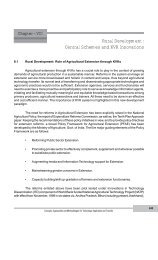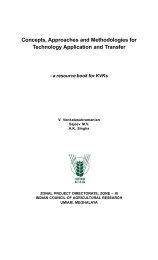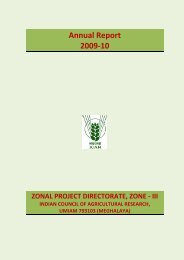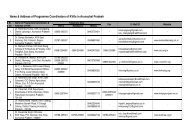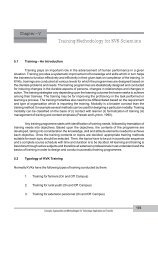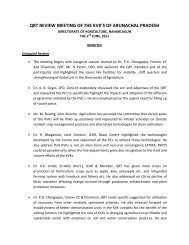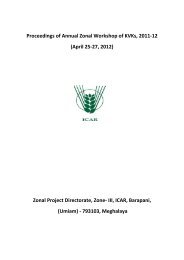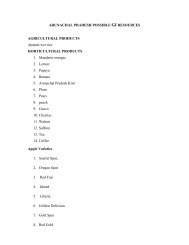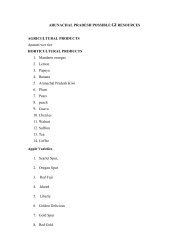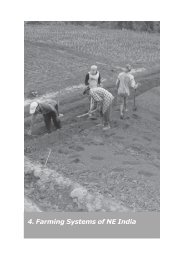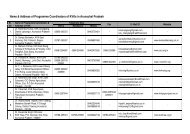Farming Systems Approach - ICAR, Zonal Project Directorate (Zone-III)
Farming Systems Approach - ICAR, Zonal Project Directorate (Zone-III)
Farming Systems Approach - ICAR, Zonal Project Directorate (Zone-III)
Create successful ePaper yourself
Turn your PDF publications into a flip-book with our unique Google optimized e-Paper software.
Sajeev M.V, V. Venkatasubramanian & A.K. SinghaActivities involved in FSRThe basic activities involved are:(a)(b)(c)(d)(e)(f)Target and research area selectionProblem identification and development of research base through quick reconnaissance surveysby inter-disciplinary teamPlanning on-farm research emphasizing alternative cropping and livestock patterns,anagement practices and other activities of householdAnalysis of results of on-farm research in terms of the statistical meaning of biologicalperformance, actual resource requirement, financial feasibilities and socio-cultural acceptability,Extension of results through multi-locational testing andEffective collaboration with other agencies closely associated with the needs of resource poorfarmers.Developments in farming systems approachesAlthough the core objective of farming system approaches have not changed, the issues on whichresearch has concentrated have evolved. Here are some areas that have seen a change in focus as wellas new developments:Early farming systems work was dominated by crops, which then widened to include livestock(esp. in less-favoured areas) and crop-livestock interactions as well as aquaculture and trees(agroforestry). Currently there are no limitations to what types of enterprises are considered(energy production, direct marketing, services, agri-tourism, health care, education, etc.). Also,there is no longer a focus on the effect of introducing a new technology. Assessing therepercussions of introducing a new enterprise in an existing system is just as important andmay follow a similar pattern.A shift from the farm system per se to a hierarchy of systems within which the farm is one of anumber of levels (crops, communities, region, markets, policy, etc.). Each level knows complexinteractions (e.g. within a cropping system: crop plant population, soil, soil organisms, weeds,insects, pathogens, etc.; within a farm: crops, livestock, trees, household members). Similarly,there are complex interactions between different scale-levels (e.g. a cropping pattern is influencedby natural conditions (soil, climate), institutions, agricultural policy, world market prices, etc.).These multi-scale approaches have led to studies at the landscape level, as well as studies thatfocus on market chains.The recognition that there are different stakeholders, and that they often have differentperspectives. Gender is an important dimension, as analysis often indicates that men holddifferent perspectives than women. Stakeholder analysis (both at the farm-level and thehigher hierarchical levels) thus provides an entry point for reconciling conflicting perspectivesand negotiating a common position.4<strong>Farming</strong> <strong>Systems</strong> of North East India



